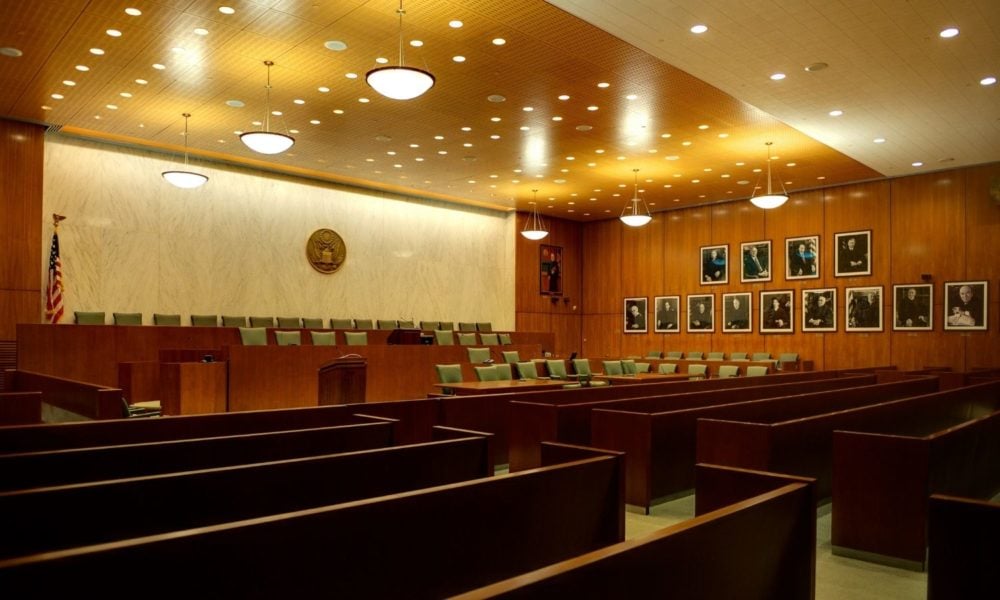This week, the Los Angeles County Superior Court will hear a case that is intended to harass and bully climate experts. In this lawsuit, a group called the Government Accountability and Oversight (GAO) organization (not to be confused, despite its easily mistaken acronym, with the US Government Accountability Office) is seeking private correspondence from climate experts at the University of California Los Angeles (UCLA) in a brazen effort to stifle their work and collaboration with others.
The group’s lawsuit seeks emails from a purportedly “secret meeting” that we at the Union of Concerned Scientists co-convened in 2016. I hate to break it to the GAO but that meeting wasn’t secret – we even wrote a public blog about it at the time. So, “secret meeting” may be a bit of an overstatement, not to mention the fact that this meeting is old news. It helped lay the foundation for what is now UCS’s Science Hub for Climate Litigation, which (among other purposes) seeks to connect legal teams with experts in relevant scientific and technical fields. The GAO group’s frivolous lawsuit tries to paint the co-sponsorship by UCLA’s Emmett Institute on Climate Change and the Environment of a public meeting to discuss climate litigation as something nefarious when there isn’t even a shred of evidence to suggest that it was. So, why does this group really want a vast number of emails from UCLA so badly? I’ll give you a hint: the GAO is a front group that claims climate change is a hoax and (although the organization does not disclose details of its funding sources) has been shown to be funded and run by the fossil fuel industry and its operatives.
This is an old strategy
Unfortunately, these UCLA academics are not the first targeted by the fossil fuel industry and its surrogates as they seek to weaponize public records laws. Cases where open records laws were weaponized against climate scientist Dr. Michael E. Mann offer perhaps the most notable examples. In one 2014 case seeking all of Dr. Mann’s correspondence while he was employed by the University of Virginia, the Virginia Supreme Court ruled Dr. Mann’s emails were protected under the state’s open records law. The court determined that the disclosure of Dr. Mann’s emails would cause “harm to university-wide research efforts, damage to faculty recruitment and retention, undermining of faculty expectations of privacy and confidentiality, and impairment of free thought and expression.” Such a list presumably reads like a wishlist for groups such as the GAO and others seeking to stop climate research and work. It is no surprise that the same attorneys from the institutions that sought Dr. Mann’s emails (e.g., Energy and Environment Legal Institute, the Competitive Enterprise Institute) also work for GAO.
Industry-funded open-records lawsuits are often filed in the name of “transparency,” but transparency is generally not the end goal. Rather, industry surrogates are mostly seeking to intimidate researchers by exposing emails that might potentially create “gotcha” media moments. The truth is, academic science is already conducted in a transparent way: results and data are generally made publicly accessible through publication of the work or via the principal investigator.
Academics outside of climate change research are also often targeted by industries attempting to weaponize open records laws. Take, for example, historians Gerald Markowitz and David Rosner who published Deceit and Denial: The Deadly Politics of Industrial Pollution. The book uncovers how the lead and chemical industries had sidelined scientific research to hide the threats their products posed to human health. Industry representatives used the Freedom of Information Act (FOIA) to seek all records from the National Science Foundation related to the work of the book’s authors.
Open records laws are not the only strategy industry-backed activists use to harass and deter academics from continuing their work. Bloggers can misrepresent researchers’ work or bully them, members of Congress can hold special hearings to cast doubt on academic work, and some organizations may even make experts’ emails, phone numbers, or addresses publicly available and encourage their supporters to act, which has sometimes resulted in death threats.
Does the strategy work?
Weaponizing open records laws to harass academic experts can have devastating effects on research. Academic researchers embroiled in such lawsuits can incur fees of up to millions of dollars and the cases often take multiple years before a final verdict is reached. Thus, universities may have to pour tons of resources, money and time, into defending their staff rather than investing those resources into research or other development opportunities for staff or students.
This harassment also can affect the mental health of the experts being targeted. Joseph DiFranza, an expert on youth tobacco addiction, was targeted by the tobacco industry in 1991. Speaking bout the experience he said, “For a while, I couldn’t sleep. Fighting their charges diverted my time from research.” Christopher Lepczyk, an ecologist, was targeted by the Best Friends Animal Society for his research on feral cat management in Hawaii. He stated that the harassment in this area of research is so awful that it deters scientists from studying the issue: “There are people I know who don’t work on [feral cat management] because they get harassed.”
Is the GAO group betting that their current case will harass these UCLA experts in similar ways to stifle research and harm the mental health of these professors? I cannot say for certain, but there’s little doubt that the organization and its fossil fuel backers are fully aware of the consequences of weaponizing open records laws against experts given their history of using the tactic.
When should open records laws be used?
The Union of Concerned Scientists is not against the use of open records laws. We fully believe that transparency is a hallmark of a good democracy and of science. And open records laws certainly apply to universities since they are partially funded by taxpayer dollars. Many open records requests at universities are entirely appropriate, especially regarding potentially fraudulent activity, financial conflicts of interest, or ethics violations. Requests for every email an academic has ever written or received, however, rise to the level of harassment.
Open records laws should never be used to harass scientists who are just doing their jobs. Unfortunately, however, today, many industry-backed groups and activists are using open records laws to stifle research they oppose. In this case brought by the GAO group, there is no evidence to suggest even a scintilla of impropriety by the climate experts—they were simply doing their jobs.
Resources for experts who are harassed
If you are an expert who is being harassed or fear that you could be in the future, there are steps you can take to ensure you are protected. Planning in advance, both individually and with colleagues, is essential in managing these types of situations. Scientists who are considering engaging as an expert in climate litigation can refer to a new pocket guide jointly published by the Climate Science Legal Defense Fund and the Union of Concerned Scientists.
If you are subject to a harassing open records request or another type of attack on your research or credibility, it is crucial to be deliberate in the first hours and days after such an attack begins, as this is often when people make the most mistakes in attempting—or not attempting—to engage.
The Union of Concerned Scientists has put together a toolkit, updated last year, that provides basic guidance on dealing with harassment as well as legitimate requests for information – you can find that resource here. You may also want to check out Climate Science Legal Defense Fund’s analysis of the existing protections for scientific records, and their applications, in each of the 50 states and the District of Columbia.

